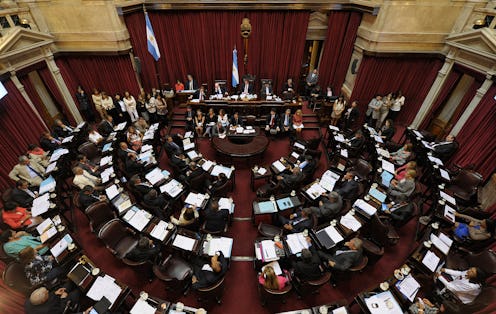News
Senate Gets Closer To Halting Iran Negotiations
On Thursday, a Senate committee advanced a bill that would impose additional sanctions on Iran, though the actual full chamber vote wouldn't happen until March. The bill had some bipartisan support, with 12 Republicans and six Democrats backing the measure. However, there's a concern — emphasized by Obama at the State of the Union, when he explicitly asked Congress to halt the bill — that additional economic sanctions could halt nuclear negotiations between the State Department and Iran.
The current round of negotiations is set to end June 30. According to the United Nations, Iran has maintained its pledge not to develop uranium beyond five percent, which is much lower than the 90 percent required to reach weapons-grade levels. The nation also began diluting the remaining stockpiles of 20 percent enrichment.
Iranian President Hassan Rouhani publicly stated:
Our ideals are not bound to centrifuges. Our ideals are bound to our hearts, brains and determination.
Iran is plagued with severe inflation, high unemployment and plunging gas prices from the strain of current western imposed sanctions. If Iran wants to rejoin the global economy, it must continue to show serious effort to ending all ambitions for a nuclear weapons program, or face addition crippling economic sanctions from the U.S. Congress. This is becoming increasingly possible, given additional Democratic support that could override the president's veto.
But not everybody is buying Iran's motives. One of the authors of the bill, Democratic Sen. Robert Menendez said in a statement:
This legislation has been carefully calibrated to achieve our ultimate goal, which is to prevent Iran from achieving nuclear weapon capability.
There has been a lot of domestic and international backlash against the proposed additional sanctions against Iran. After the bill passed committee, the White House issued another veto threat. More remarkably, in a rare opinion piece in The Washington Post, senior diplomats from Great Britain, Germany, and the European Union made the case to American officials to step back from any proposed sanctions legislation, which could seriously disrupt or end the sensitive negotiations:
We can’t let that chance pass us by or do anything to derail our progress. We have a historic opportunity that might not come again. With the eyes of the world upon us, we must demonstrate our commitment to diplomacy to try to resolve the Iranian nuclear issue within the deadline we have set. That is the surest path to reaching a comprehensive, lasting solution that will make the world and the region safer.
Members of Congress and the U.S. government have a vested national security interest in ensuring that Iran does not obtain a nuclear weapon, but preventing the regime from obtaining weapons-grade uranium could easily fail if the door of communication is closed. And who knows when the conditions for multilateral talks could happen again. If there is to be a long-term solution, both states must be willing to meet halfway — if the current Senate bill gains momentum, this may no longer be possible.
Images: Getty Images (2)
